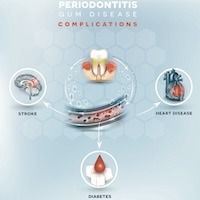Gum Disease and Diabetes: A Two-Way Relationship
October 16th, 2024

Diabetes is a chronic condition that the CDC says affects one in two Americans. As it turns out, individuals who have difficulty controlling blood sugar may also be at triple the risk for developing gum disease. With diabetes, the glucose in your saliva increases, feeding harmful bacteria that causes cavities and increasing the progression and severity of severe gum disease.
Having severe gum disease (periodontitis) means that your gums are inflamed, which can lead to all the problems associated with chronic inflammation including higher blood glucose levels, increasing your risk for diabetes. It’s a vicious circle.
Ways You Can Help Yourself
Some studies say that almost 25% of U.S. adults with diabetes aged 50 and older have severe tooth loss, compared to about 16% for those without diabetes. The CDC says that “for every 1% increase in hemoglobin A1C level, the odds of periodontitis increases by 18%.”
Regular dental visits may help reduce your risk of diabetes and/or even help you control the disease. If you already have diabetes, be sure to share your diagnosis with your dental specialists. Professional periodontic treatments and improved oral hygiene at home can reduce bacteria in your mouth which then reduces inflammation. Eating healthy foods, brushing twice daily, cleaning between your teeth (interdental toothbrush or floss) are also very important.
If You Smoke – Stop!
Don’t forget that smoking can affect the body’s ability to heal and fight infection.
The CDC says that smokers have twice the risk for gum disease compared to nonsmokers, and that treatments for gum disease may not work as well for people who smoke. Smokers also show an increased risk for type 2 diabetes since smoking also negatively affects the body’s ability to regulate blood sugar levels.
Those with diabetes and who quit, the CDC says, can also better manage their blood sugar levels. As the American Diabetes Association notes: “Total body care, including your mouth, is essential when managing diabetes.”
Keeping your mouth “clean” can significantly help you manage diabetes and prevent related problems. If you’ve been diagnosed with gum disease, keep in mind that in its earliest stage, called gingivitis, the disease can be reversed. If you have a later stage of gum disease, we’ll customize a treatment plan to help you manage the disease, improve your smile and your overall health.
Concerned about your gum health and how it could be affecting your blood sugar levels? Contact us at 561-912-9993 and make an appointment with one of South Florida’s top dental specialists. Referrals are always welcomed but are not required.
